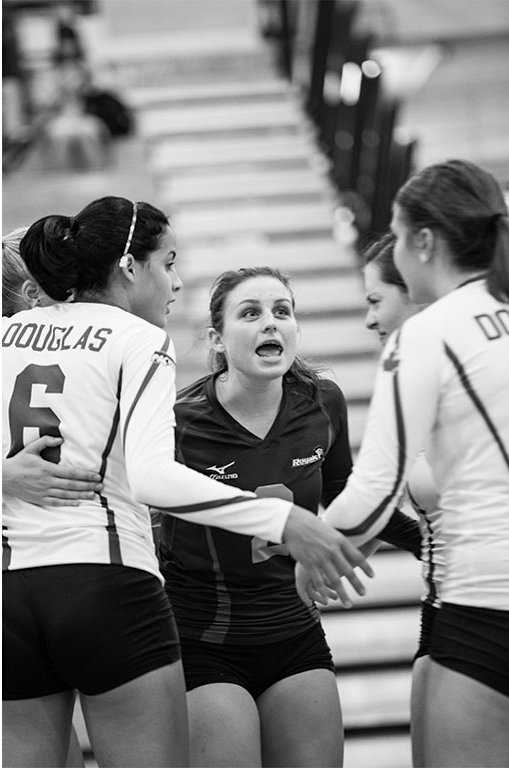The role of study hall for student athletes
By Courtnie Martin, Sports Reporter
The first few weeks as a freshman can be quite overwhelming. How do I get to my classes? What books do I need? Did I get my U-Pass? How do I catch the SkyTrain from the New West campus to the Coquitlam campus? (You can’t.)
Not to mention, Jake Elder, strength and conditioning coach, is probably running your ass into the ground with workouts, you’re a bit sore, practices are four to five times a week, study hall is mandatory two hours a week, and you have to come up with money for team fees. Talk about overwhelming! Is it reasonable to believe that you can maintain a high level of commitment to both athletics and academics? Let’s be real: most of us athletes just want to do enough to be eligible to play.
Ask yourself this one question: “Why am I here?”
Rookie men’s volleyball player Matt Santema said, “I am only here to play. I got straight A’s in high school so I know I am capable, but really I just want to play… If people would just open their books, they could pass their classes.”
In retrospect, if you’re only here because you want to play, then your chances of being successful beyond college are slim. At Douglas College, it is required that you maintain a 2.0 GPA to compete. All rookies and any player with a GPA less than 2.4 must attend study hall. Academic coaches are available Monday through Thursday from 9 a.m. until 4 p.m. and Friday from 9 a.m. until noon. If players don’t complete two hours in that week, they are not eligible to suit up for the upcoming game, regardless of whether they have a qualifying GPA or not.
One controversial discussion that has surfaced the first few weeks of school is the mandated attendance at study hall for all rookies.
Rookie men’s volleyball player Devon Dunn said, “I don’t think study hall helps. The hours conflict with my classes and makes it difficult to get there. I would rather do my homework at home.”
On the flip-side, women’s volleyball rookie Madison Burt said, “I have a hard time balancing studies and athletics; study hall is a huge help for me.”
Acknowledging that you’re a student first and an athlete second is very important. Once you have done so, it is vital you learn time management. Women’s basketball team freshman Amber Beasley said, “I found that using my calendar in my cellphone really helps me with practice times, homework due dates, tests, workouts, game schedules, and day-to-day reminders.”
After interviewing several rookies, it seemed necessary to ask an academic coach for an official position on the mandatory attendance.
Women’s basketball and academic coach Curtis Nelson was passionate in his response: “Do I think study hall improves student-athlete grades? Yes, absolutely I believe it does.” According to Nelson, since the inception of study hall three years ago, not only has the average GPA of Douglas’ student athletes risen, but the average GPA of a Douglas student athlete is actually higher than that of a regular student.
He also spoke to the dedication of the academic coaches to the program. “We provide more than just a room to study in. Because the academic coaches get to know each of the players personally in study hall, and we also have great relationships with the instructors here at Douglas, we can bridge the gap a bit, and work with everyone to help track each player’s academic progress.”
As a testament to the success of study hall, Nelson noted that other colleges and universities in BC and across Canada have been contacting Douglas for help with their own student athletes.
Responding to some students’ complaints about the mandatory time in study hall, he said, “Some [National Collegiate Athletic Association] NCAA schools require two hours per day, or even more. So to complete two hours every week here at Douglas is something that is quite easy to do. Just like working out, if you say, ‘I’ll do it when I have time,’ you will never make time to get it done. But if you know you need to make the time, you carve that out in your schedule and it becomes part of your regular routine.”
Two major things can prevent any student athlete from reaching their maximum potential, and one is procrastination. First-year softball player Kelsey Hari admits her procrastination prevents her from getting higher test scores: “I am a huge procrastinator. Although the class sizes are small and Douglas is a great transition from high school, I still procrastinate. If I learn to use my time better and stay off of social networks I know my grades will improve.”
Secondly, save the partying for a well-deserved night. If you are struggling with your classes but your friends want to hit the town, you should probably prioritize what is important. As a student athlete you are held to high expectations, and with or without study hall, procrastination and not maximizing your potential successes will ultimately only hurt you.

